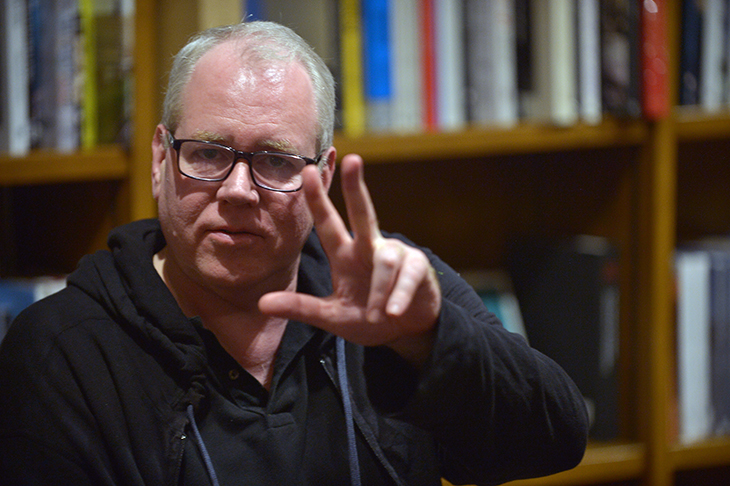Q: What’s worse than listening to someone ranting hysterically about Donald Trump? A: Listening to Bret Easton Ellis ranting hysterically about people ranting about Trump.
I gave him a fair hearing, I really did. Some of what Ellis has to say in White, his first work of non-fiction, is not stupid. It’s true that teeth-gnashing over Trump’s presidency can seem alarmingly out of touch with the realities of modern America. I share his concern that aesthetics are increasingly, regrettably, being sidelined in favor of ideology. His film criticism is unfailingly lucid and intelligent. I wish there had been more of it.
Ellis is used to being pilloried for his tweets, podcasts and journalism. He is surely expecting his provocatively titled book to have an incendiary effect on many readers; millennials, for a start, whom he has famously labeled ‘Generation Wuss’ because of their ‘over-sensitivity, their sense of entitlement, their insistence that they were always right, despite sometimes overwhelming proof to the contrary’. In what is habitually incoherent reasoning, he assures us that he ‘never pretended to be an expert on millennials’; all that he has to say (lots) is based ‘solely on personal observation’. His trump card is that his boyfriend is a millennial 22 years his junior. Which in the context of this book is a bit like saying ‘some of my best friends are black’.
So did my wussy millennial self crumble in the face of this gnarly Gen-Xer’s straight-talking? Well, no — because like most millennials, Gen-Xers and Baby Boomers, I don’t identify all that strongly with my generation. It seems horribly crude to impose a handful of shared characteristics on 25 percent of the population. And why should we trust Ellis’s powers of ‘personal observation’ when he keeps saying things such as ‘men will be men, boys will be boys, dudes will be dudes, and nothing’s ever going to change that’?
Again, trying hard to give him a fair hearing, I think I know what he’s talking about. He’s expressing an interesting viewpoint, well worth debating: that there are essential male characteristics which will always be part of our social reality. But there’s no nuance, no acknowledgment of the latest research into biological difference between the genders. Above all, saying ‘nothing’s ever going to change that’ stupidly overlooks the significant shifts in what it meant to be a man in, say, 1939, 1989 and 2019.
Ellis thinks that this is a unique crisis situation: a few brave Gen-Xers vs the repressive Orwellian thought-policing millennials. In fact it’s an age-old, archetypal relationship. Put simply, the older generation always think the younger generation have it too easy — ‘It weren’t like that in my day’— while the younger generation think that times have moved on, often for the better. And who wants to read some old bloke banging on about the good old days?
‘As a 1970s kid there were no helicopter parents: you navigated the world more or less on your own, an exploration unaided by parental authority. Parents today document their children’s every move on Facebook and pose them on Instagram and urge them into safe spaces…’
This is typically thoughtless: some parents today document their children’s every move on Facebook. Ellis is aware of them because of their visibility. All the parents not doing this are de facto invisible. And he doesn’t stop to consider what might be gained by the introduction of social media into the domestic sphere — such as the alleviation of loneliness, and therefore improved mental health, for parents stuck at home alone with tiny children.
Kids these days, according to Ellis, are told how special they are at every opportunity — and so they go to pieces at the first sign of real difficulty. Unlike Gen-Xers: ‘I can’t remember hearing about a single peer’s suicide during my childhood and adolescence — either nationally or within the LA private school system.’ Perhaps because there was no social media in the 1970s? He is dismissive of the suicide of Tyler Clementi, ‘an 18-year-old Rutgers student who killed himself because he felt he’d been bullied by his roommate’. The roommate secretly filmed Clementi making out with another man and then tweeted about it. Ellis calls this ‘a prank’, and argues with his millennial boyfriend about it:
‘Was this just the case of an overly sensitive Generation Wuss ‘snowflake’? (I enjoyed using this term because it seemed, amazingly, to press so many buttons.)’
Perhaps his use of the term ‘snowflake’ presses buttons not because the boyfriend is an oversensitive snowflake but because it upsets him to hear his partner behaving like a clichéd old fogey. And it really is old-fogeyish behavior to bang on about snowflakes without listening to what they have to say. (See Mike Bartlett’s thoughtful play Snowflake for a balanced examination of this inter-generational friction.)
There is no real evidence of listening anywhere in White. The occasional flashes of insight only highlight the tragedy of what this once-sharp mind has become.
This article was originally published in The Spectator magazine.

























